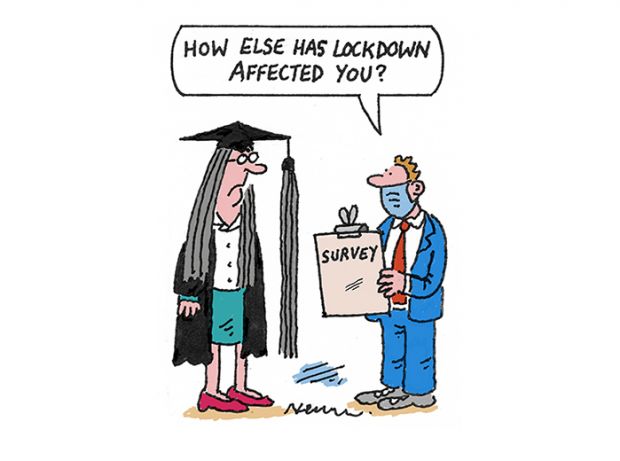
Without a physical graduation ceremony to attend because of the pandemic, many new graduates have been taking matters into their own hands and posting their results on social media. The Daily Mail reported how some have celebrated with virtual drinks involving classmates and lecturers, but others have held graduation “parties” in their back gardens and living rooms. However, with official graduation wear often unavailable, some improvisation has been required on that front. Pictures collated by the newspaper included an impressive array of home-made mortar boards, including one made from a pillow, while other attire often seemed to be any outfit that loosely matched the description of a graduation gown.
Boris Johnson’s love of sprinkling interviews with Latin and Greek phrases has not endeared him to the UK’s most well-known classicist. In an interview with Times Radio, Dame Mary Beard said that the prime minister’s habit of “throwing out…little Latin quotes makes me want to be sick” because it reinforced the idea that Classics is just for “upper-class Tories”. “It give[s] the impression that studying Classics is a very conservative thing to do,” said Professor Beard. Since surviving Covid-19, Mr Johnson, who studied Classics at the University of Oxford, is said to have told officials “Salus populi suprema lex esto”, or “the health of the people should be the supreme law”, The Times reported. Dropping these classical allusions was also unhelpful because it gave his ideas a veneer of legitimacy that went over voters’ heads, said Professor Beard. “For me, studying the ancient world is about opening up the subjects − not about using it as a gatekeeper to the posh.”
The race to find a Covid-19 vaccine was meant to be a moment when international powers put aside their differences to work together for the common good. Vladimir Putin, it seems, did not get the memo, after the UK, US and Canada accused Russia of trying to hack into vaccine research from Western universities and pharmaceutical firms. The cyber group known as Cozy Bear – believed to be associated with Russian intelligence agencies − was named the culprit behind the attempted hacks, with the University of Oxford and Imperial College London thought to be among those targeted, The Times reported. Dominic Raab, the foreign secretary, condemned the cyber attacks as “completely unacceptable”. “While others pursue their selfish interests with reckless behaviour, the UK and its allies are getting on with the hard work of finding a vaccine and protecting global health,” said Mr Raab.
When a scrawny Japanese man named Takeru Kobayashi devoured 50 hot dogs in 12 minutes almost 20 years ago, doubling the previous world record, scientists began to take an interest in the world of competitive eating. And, with 75 hot dogs consumed in just 10 minutes at this year’s Nathan’s Famous Hot Dog Eating Competition in Brooklyn, some have wondered how high the record could go. Not too much higher is, however, the answer, according to James Smoliga, a veterinary scientist from High Point University in North Carolina, who has calculated it is physically impossible to consume more than 83 hot dogs in 10 minutes. However, Professor Smoliga told The New York Times that the current world champion, Joey Chestnut, who can eat 7.5 hot dogs a minute, may lose out if faced with a rival from the wild; a bear could eat eight hot dogs a minute, while a grey wolf could eat an enormous 11 dogs a minute, although would probably lose interest after a couple of minutes.
With many universities grappling over opening again in the autumn for face-to-face teaching, some institutions in North America have been looking at using waivers as a way to ensure they are protected from any subsequent legal action if they resume full campus operations. But as one university in Canada found out, even bringing in such waivers is far from straightforward. St. Francis Xavier University in Nova Scotia had asked students to sign a three-page form – which would mean their abandoning “any and all claims” relating to Covid-19 – as a condition of returning to campus. But after several days of protest by students, alumni and staff, the president of the institution relented, issuing a note to the campus community promising to “review this decision to ensure it presents the best way forward”.
Register to continue
Why register?
- Registration is free and only takes a moment
- Once registered, you can read 3 articles a month
- Sign up for our newsletter
Subscribe
Or subscribe for unlimited access to:
- Unlimited access to news, views, insights & reviews
- Digital editions
- Digital access to THE’s university and college rankings analysis
Already registered or a current subscriber? Login



